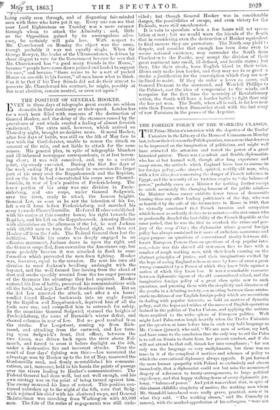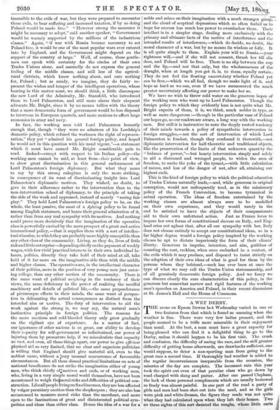THE FOREIGN POLICY OF TELE WORKING CLASSES. insensible to the
evils of war, but they were prepared to encounter those evils, to bear suffering and increased taxation, if by so doing Poland would be made free." "However strong the measures it might be necessary to adopt," said another speaker, "Government would be warmly supported by the millions of the industrious classes." Again, "if war with Russia became necessary to set Poland free, it would be one of the most popular wars ever entered into by England, and the Government might depend on the support of the country at large." Well, of course, these gentle- men can speak with certainty for the circles of their own Trades Unions alone, and assuredly do not express the general feeling of the middle classes, and still less of the agricul- tural districts, which know nothing about, and care nothing for, Poland ; but as surely, we imagine, they do fairly re- present the wishes and temper of the intelligent operatives, whose bearing in this matter must, we should think, a little discompose the new Lord of the Admiralty, Mr. Stansfeld, who introduced them to Lord Palmerston, and still more alarm their eloquent advocate Mr. Bright, since it by no means tallies with the theory that a more democratic form of government would be less disposed to intervene in European quarrels, and more anxious to effect large economies in army and navy.
In fact, the working men told Lord Palmerston honestly enough that, though "they were no admirers of his Lordship's domestic policy, which refused the workmen the right of represen- tation," they yet "admired his general foreign policy, and hoped he would act in this question with his usual vigour,"—a statement which it must have caused Mr. Bright considerable pain to read. Indeed—except with respect to his Italian policy—the working men cannot be said, at least from • their point of view, to show great discrimination in this general endorsement of Lord Palmerston's foreign diplomacy. But what they mean to say by this strong eulogium is only the more striking, in consequence of its want of discriminating insight into Lord Palmerston's diplomatic motives. They wished, no doubt, to give in their adherence rather to the intervention than to the non -intervention school of diplomacy, to the principle of taking the side of the weak and oppressed, instead of merely "seeing fair play." They hold Lord Palmerston's foreign policy to be, on the whole, the least passive, the most of a fighting policy to be found among English statesmen, and hence their general admiration of it, rather than from any real sympathy with its motives. And nothing could prove more decisively that the imagination of the operative class is powerfully excited by the mere prospect of a great and active international policy,—that it supplies them with a sort of intellec- tual stimulus, to which they are probably more highly susceptible than any other class of the community. Living, as they do, lives of little risk and little enterprise —depending chiefly on the payment of weekly wages, with few vivid 'practical interests in their own individual la- bours, politics, directly they take hold of their mind at all, take hold of it far more on the imaginative side than with the middle and higher classes. The operatives are, in the intellectual character of their politics, more in the position of very young men just enter- ing college, than any other section of the community. There is the same want of political weighting in the tendency of their views, the same deficiency in the power of realizing the needful machinery and details of political life,—the same preponderance of picturesque effects in their minds, the same want of perspec- tive in delineating the actual consequences as distinct from the intended aim or motive. The duty of intervention to aid the weak against the strong is, we may say, the natural man's instinctive principle in foreign politics. • The reasons for the more cautious and cold-blooded theory only grow gradually on the vigilant eye of experience. As a matter of fact, our ignorance of other nations is so great, our ability to develop their capacity for self-government so infinitesimal, our power of injuring them by premature help, if we miscalculate that capacity so vast, and even, all these things apart, our power to give efficient physical aid so very limited, that no clear and sagacious politician is willing that England should give material aid, even to the noblest cause, without a ;very unusual concurrence of favourable circumstances. But all these dismal practical limitations on acts of national beneficence do not strike the imagination either of young men, who think chiefly of:motives and ends, or of working men, who, living in a very simple moral world themselves, have not been accustomed to weigh thelmoral risks and difficulties of political con- struction. Lik e all people living on fixed incomes, they are less affected by vulgar pecuniary caution than the shopkeepers ; they are also less accustomed to measure moral risks than the merchant, and more open to the fascinations of great and disinterested political sym- pathies and ideas than either class. Hence the idea of a war for a noble end seizes on their imagination with a much stronger grasp; and the cloud of sceptical depressions which so often forbid us to hope for success has much less power to overshadow them. Their intellect is in a simpler stage, dealing more exclusively with the primary and ultimate facts of the motive of interference and the intended results of interference,—which do decide, no doubt, the- moral character of a war, but by no means its wisdom or folly. It is all quite simple to them. Explain your will to Russia,—your righteous will,--and if she will not consent, thrash her till she does, and Poland will be free. There is no slip between the cup. and the lip,—and not that only, but the wholesomeness of the- draught, when at length you get it, is, to them, equally certain. Theydo not feel the floating uncertainty whether Poland yet can be free,—which we all feel, though we make light of it, and hope as hard as we can, even if we have surmounted the much greater uncertainty affecting our power to make her so.
We have no wish to throw cold water on the generous hopes of the working men who went up to Lord Palmerston. Though the foreign policy to which they evidently lean is not quite what Mr. Bright expects of them, it is, we think, much nobler in type, as. well as more dangerous :—though in the particular case of Poland our hopes go, as our readers are aware, a long way with the working men. But still it is instructive to note the deeply rooted tendency of their minds towards a policy of sympathetic intervention in foreign struggles,—not the sort of intervention of which Lord Palmerston is fondest, though they confound it therewith,—not diplomatic intervention for half-theoretic and traditional objects, like the preservation of the limits of that unknown quantity the- " balance of power,"—but hearty intervention simply and solely to aid a distressed and wronged people, to widen the area of freedom, to smite the yoke of the tyrant,—with little calculation of means, and less of the danger of not, after all, attaining our highest ends.
This is the kind of foreign policy to which the political education of Trades Unions naturally leads,—and, while generous in original conception, would not unfrequently tend, as in the missionary policy of the French Convention, to become tyrannical in actual operation. The ideas of freedom entertained by the working classes are almost always sure to be modelled on their own experience, and they would rarely in the end be satisfied to leave the objects of their compassionate- aid to their own unfettered action. Just as France loves to impose her own forms of constitutional duresse on Italy, and Eng- land cries out aghast that, after all our sympathy with her, Italy does not choose entirely to accept our constitutional ideas, so in a- far higher degree would a foreign policy inspired by the working classes be apt to dictate imperiously the form of their clients' liberty. Generous in impulse, intention, and aim, guiltless of counting the cost, reckless, when once embarked in a contest, of the evils which it may produce, and disposed to insist strictly on the adoption of their own ideas of what is good for them by the persons whom they befriend,—such has ever been at once the type of what we may call the Trades Union statesmanship, and of all genuinely democratic foreign policy. And we fancy we- can discern clearly the sure characteristics of this policy, in the generous but somewhat narrow and rigid features of the working men's speeches on America and Poland, in their recent discussions- at St. James's Hall and the House of Commons.































 Previous page
Previous page